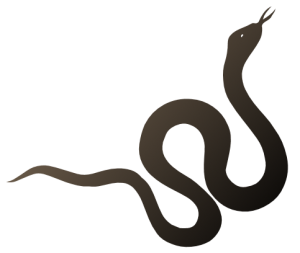
Once there was a very poor brāhmaṇī widow, whose only son was
a beautiful and charming boy of about nine. She lived in a hut and
maintained herself and her son by begging. She had been initiated by a
high-class Vaiṣṇava and worshiped Ṭhākurajī every day. She was happy
in her life of worshiping, chanting, and remembering Kṛṣṇa.
One day, very early in the morning while the brāhmaṇī was engaged
in some duty, she requested her son to bring some flowers from the
nearby bushes for her worship. The boy happily set out to follow her
order, and began to pick belī, cāmeli, and other flowers from the bushes.
While he was in the midst of picking flowers, a poisonous black snake
came and suddenly bit him. His whole body at once became black, and
he fell flat on the ground and died.
A hunter happened to be walking in the forest at that time, and
became very compassionate when he saw this incident. He chanted a
mantra by which one can control snakes very easily. When the serpent
heard the hunter’s mantra, it became peaceful, and the hunter was thus
able to put it in the clay pot he had been carrying. The hunter covered
the mouth of the pot and picked it up again, and then approached the
boy’s mother, carrying his body in his arms.
When the old widow saw her son, she cried out, “What happened?”
and began to weep bitterly, “Alas! Alas!” After some time, when she
became somewhat pacified, the hunter told her, “Mother, I was there
when the boy was picking flowers. He was innocent. He didn’t attack
or disturb the snake at all. The snake came from inside the bushes and
bit him for no reason.
“I have caught that poisonous snake by mantra, and kept it in this
pot. Please order me to cut the snake into pieces. I will then burn it,
and there will be no trace of its existence. Please order me. Please
order me.”
The hunter appealed to the old widow again and again, but she
simply asked him, “Oh, hunter, suppose you kill this poisonous serpent
and burn its body. Will that bring my son back?”
“Never.” he replied.
“Then why should you kill it?” she asked. “I don’t want to kill it.”
The hunter insisted, “This serpent is wicked. He may bite someone
else. You must order me to kill and burn it.” That kind brāhmaṇī widow
was a realized soul and a devotee of Kṛṣṇa. She simply replied, “Why
should you kill the serpent if that will not bring my son back? Please
don’t kill it.” Again the hunter repeated, “if I don’t kill this serpent, he
will attack some other passer-by without any reason.”
At this point, the serpent interrupted, “Why should you kill me? I
was living in those bushes for years and years without biting anyone. I
only bit this boy today because Death came and told me, ‘You should
bite him.’ I’m innocent. Don’t kill me.”
At that moment Yamarāja Mahārāja, Death personified, the
controller everyone’s deaths, personally appeared at that spot. He said
to the snake, “Are you saying that I have caused this to happen? That I
have ordered you to bite the boy? I never did so. Why accuse me? I am
not responsible for this.
“The boy is responsible for his own actions. When he was a human
being in his previous life, the serpent also had a human body. They had
a fight, and this boy killed the other person. The person he murdered
has now taken birth as the snake and has taken his revenge. Actually,
the boy’s past actions are like a poisonous snake, which bit and killed
him. I myself, Yamarāja, am not responsible for this; neither is the
serpent.”
If any problem comes in your life, it means that you have done
something wrong in the past and now the result is coming. Why are
you now afraid to taste the result? You must taste it. If you are fearing,
if you don’t want the result, still it will come. You will have to taste the
results of all of your bad actions, and this is similarly true regarding
your good actions. Don’t fear. Kṛṣṇa has arranged all situations.
―Śrīla Bhaktivedanta Nārāyaṇa Mahārāja








